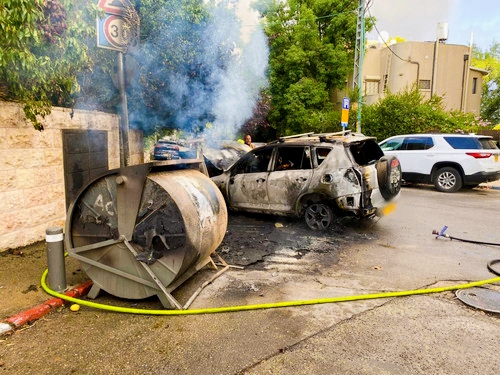The pace of protests in Israel escalated today, Wednesday, with clashes erupting between angry demonstrators and police forces near Prime Minister Benjamin Netanyahu's home in the Rehavia neighborhood of Jerusalem, amid urgent calls for a prisoner exchange deal with Hamas before the anticipated attack on the city of Gaza.
The protesters, as part of what has come to be known as "Day of Disturbance," set fire to garbage containers and car tires, causing significant material damage in the Rehavia and Givat Ram neighborhoods, including damage to several vehicles, according to a statement from the Israeli police.
The police added that several residents were evacuated from nearby buildings as a precautionary measure, confirming that no injuries occurred.
The statement confirmed that firefighting and rescue teams managed to control the flames, describing the incident as an "illegal and irresponsible act" that poses a danger to citizens' lives.
* Protests expand and escalate
In a related context, a number of demonstrators staged a sit-in on the roof of the National Library in Jerusalem, protesting the government's failure to reach an agreement that leads to the release of Israeli prisoners held in the Gaza Strip, while the police intervened and forcibly evacuated them, according to Israeli Channel 12.
A convoy of protest cars also set off from the Latrun junction towards Jerusalem, amid repeated calls to stop the war in Gaza and focus on the release of prisoners before it's too late.
These popular movements are led by the organization "Defenders of Hostage Rights in Gaza," which launched the "Day of Disturbance" campaign to highlight the suffering of Israeli prisoners and pressure the Israeli government to accept the proposed exchange deal and end the ongoing war for months.
* Hamas agrees and Netanyahu refuses
These protests come amid Prime Minister Benjamin Netanyahu's rejection of the latest offer presented by mediators, which called for a ceasefire and a prisoner exchange deal between Israel and Hamas, as confirmed by the Qatari mediator on Tuesday.
In contrast, Hamas announced its acceptance of the offer, increasing the pressure on the Israeli government from the families of the prisoners and human rights organizations.
* Danger approaching the lives of prisoners
Israeli families are living in a state of increasing anxiety, especially with the impending military operation of the Israeli army inside the city of Gaza, where it is believed that some prisoners are still being held.
Many fear that any large-scale military operation could lead to the deaths of those who remain.
According to the latest official Israeli estimates, it is believed that about 20 Israeli prisoners are still alive inside the Gaza Strip, while the deaths of 28 others have been confirmed since the war began in October 2023.
* Increasing internal anger
Netanyahu's government is facing sharp criticism from the families of the prisoners and public opinion, as they see that the continuation of military operations without reaching a prisoner exchange agreement endangers the lives of those detained.
The capital has turned into a stage for widespread public anger, which could herald an expansion of protests in the coming days if the government continues to reject the proposed diplomatic solutions.

